-
 Bitcoin
Bitcoin $115100
1.27% -
 Ethereum
Ethereum $3675
2.71% -
 XRP
XRP $2.995
1.45% -
 Tether USDt
Tether USDt $1.000
0.02% -
 BNB
BNB $769.8
2.64% -
 Solana
Solana $168.0
3.25% -
 USDC
USDC $0.9999
-0.01% -
 TRON
TRON $0.3371
1.48% -
 Dogecoin
Dogecoin $0.2051
3.36% -
 Cardano
Cardano $0.7394
2.30% -
 Hyperliquid
Hyperliquid $38.15
0.42% -
 Stellar
Stellar $0.3966
-0.36% -
 Sui
Sui $3.486
2.93% -
 Chainlink
Chainlink $16.72
2.52% -
 Bitcoin Cash
Bitcoin Cash $568.0
4.36% -
 Hedera
Hedera $0.2440
2.59% -
 Ethena USDe
Ethena USDe $1.001
0.04% -
 Avalanche
Avalanche $22.16
2.06% -
 Litecoin
Litecoin $119.1
-0.73% -
 UNUS SED LEO
UNUS SED LEO $8.991
0.04% -
 Toncoin
Toncoin $3.232
-0.39% -
 Shiba Inu
Shiba Inu $0.00001233
2.82% -
 Uniswap
Uniswap $9.717
2.53% -
 Polkadot
Polkadot $3.664
1.85% -
 Dai
Dai $1.000
0.01% -
 Monero
Monero $281.2
-3.89% -
 Bitget Token
Bitget Token $4.350
1.55% -
 Cronos
Cronos $0.1428
5.07% -
 Pepe
Pepe $0.00001050
3.68% -
 Aave
Aave $262.3
3.54%
ETH ETF vs buying ETH directly which is better?
An ETH ETF offers exposure to Ethereum's price without direct ownership, providing a secure and regulated way to invest through traditional brokerage platforms.
Jul 10, 2025 at 03:50 pm
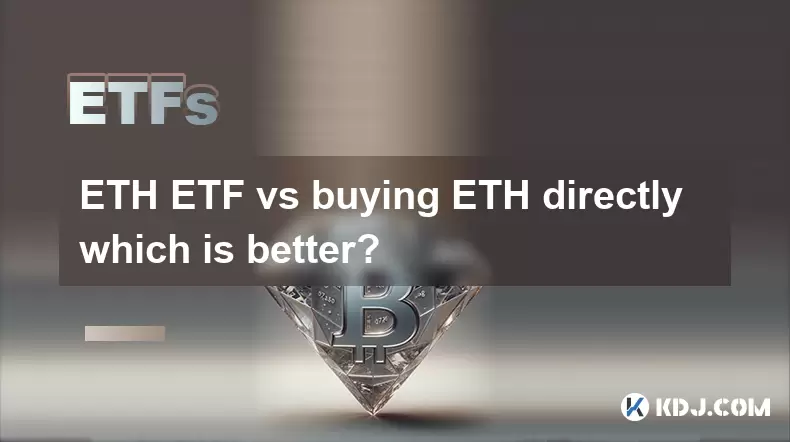
Understanding ETH ETFs and Their Mechanism
An ETH ETF (Ethereum Exchange-Traded Fund) is a financial product that allows investors to gain exposure to Ethereum without directly owning the cryptocurrency. These funds are traded on traditional stock exchanges, making them accessible to a broader audience. The ETF tracks the price of Ethereum by holding either actual ETH or derivative contracts linked to its value. Investors benefit from the fund's performance in line with ETH's market movement.
Unlike direct ownership, ETH ETFs do not grant access to private keys or blockchain participation, which eliminates some risks related to wallet security and theft. However, this convenience comes with intermediary fees and potential tracking discrepancies. ETFs are subject to regulatory oversight, which can offer a layer of investor protection but also introduces compliance costs.
The structure of an ETH ETF typically involves authorized participants who create or redeem shares based on demand. This mechanism ensures liquidity while maintaining alignment with Ethereum’s real-time price. For those unfamiliar with crypto wallets or exchanges, an ETH ETF offers a simplified way to invest in Ethereum through familiar brokerage platforms.
Buying ETH Directly: Process and Considerations
Purchasing Ethereum directly involves acquiring ETH tokens via a cryptocurrency exchange or peer-to-peer transaction. Users must first set up a digital wallet compatible with Ethereum, such as MetaMask, Trust Wallet, or hardware wallets like Ledger. After selecting a reliable exchange—like Binance, Coinbase, or Kraken—users complete identity verification and deposit fiat currency or another cryptocurrency to trade for ETH.
Once purchased, ETH must be securely stored. While some users keep their assets on exchanges for trading convenience, this exposes them to counterparty risk. Transferring ETH to a personal wallet enhances security, especially when using cold storage solutions. Additionally, direct ownership allows participation in staking, governance proposals, and decentralized finance (DeFi) protocols.
However, managing private keys requires technical knowledge and vigilance. Mistakes like sending ETH to the wrong network or losing recovery phrases can lead to permanent loss. Therefore, buying ETH directly demands a higher level of responsibility compared to investing in an ETF.
Cost Comparison: Fees and Expenses
When evaluating cost efficiency between ETH ETFs and direct ETH purchases, several fee structures come into play. ETH ETFs usually charge management fees ranging from 0.25% to 1% annually, depending on the provider and fund structure. These fees cover administrative costs, custody services, and regulatory compliance. Although seemingly low, these expenses compound over time and may reduce long-term returns.
Conversely, buying ETH directly incurs trading fees on exchanges, which vary widely. Most platforms charge between 0.1% to 0.5% per trade, though high-volume traders might qualify for reduced rates. In addition, network transaction fees (gas fees) apply when transferring ETH between wallets or interacting with smart contracts. Gas prices fluctuate based on network congestion, sometimes reaching significant levels during peak times.
Storing ETH on exchanges generally has no direct cost, but optimal security often requires third-party wallet services, which may include subscription models or one-time purchase costs for hardware devices. Hence, while direct ETH ownership avoids annual management fees, it introduces variable transaction and security-related expenses.
Liquidity and Accessibility Differences
One critical factor in choosing between ETH ETFs and direct ETH ownership is liquidity. ETH ETFs are traded on major stock exchanges like NYSE or NASDAQ, offering seamless buying and selling during regular market hours. This accessibility benefits institutional and retail investors accustomed to traditional markets.
On the other hand, Ethereum itself operates 24/7 on decentralized networks, allowing instant transfers and trades across global exchanges. Unlike ETFs, which are bound by market holidays and limited trading windows, direct ETH ownership provides unrestricted access to liquidity at any time.
However, converting ETH back to fiat may involve additional steps, particularly in regions with strict capital controls or limited banking integrations. Meanwhile, ETFs provide straightforward redemption mechanisms through brokers, aligning with conventional investment practices. Therefore, liquidity preferences largely depend on investor habits and geographic location.
Security Aspects: Risks and Protections
Security considerations differ significantly between ETH ETFs and direct ETH ownership. Since ETFs are custodied by financial institutions, they eliminate individual exposure to hacking, phishing, or wallet mismanagement. Regulated entities implement robust cybersecurity measures, ensuring asset safety under legal frameworks.
In contrast, direct ETH holders bear full responsibility for securing their private keys. Loss or theft results in irreversible consequences, with no recourse available in most cases. Although hardware wallets and multi-signature solutions enhance protection, they require proactive user engagement and understanding of best practices.
Additionally, smart contract vulnerabilities pose risks when using DeFi platforms or yield-generating strategies. ETH ETFs bypass these concerns entirely, offering a more conservative approach suitable for risk-averse investors. Thus, security preferences influence whether an investor leans toward ETFs or direct ownership.
Tax Implications and Reporting Requirements
Tax treatment varies between ETH ETFs and direct ETH investments, impacting overall returns. In many jurisdictions, ETH ETFs are classified as securities, leading to standard capital gains taxation upon sale. Brokers often issue tax documentation automatically, simplifying compliance for investors.
Conversely, holding and transacting ETH directly triggers taxable events under most regulations. Selling, swapping, or spending ETH typically constitutes a taxable disposition, requiring meticulous record-keeping. Some countries mandate reporting even for wallet transfers, adding complexity to compliance.
Moreover, staking rewards or DeFi earnings derived from owned ETH may incur income tax liabilities, further complicating the process. While ETFs streamline tax reporting through established financial systems, direct ETH ownership demands greater diligence in tracking transactions and fulfilling obligations.
Frequently Asked Questions
Can I convert ETH ETF shares back to physical Ethereum?
No, ETH ETF shares represent exposure to Ethereum's price but do not grant ownership of actual ETH. Conversion to physical Ethereum is not supported within ETF structures.
Do ETH ETFs pay dividends or interest?
Generally, ETH ETFs do not distribute dividends or interest, as Ethereum does not generate income like stocks or bonds. Returns depend solely on price appreciation.
Is it possible to stake Ethereum held through an ETF?
No, stakeable rights belong to the custodian managing the ETF's underlying assets, and individual shareholders cannot participate in staking or governance activities.
Are there minimum investment requirements for ETH ETFs versus direct ETH purchases?
ETH ETFs often have lower entry barriers, allowing fractional share purchases through brokers. In contrast, direct ETH buying depends on exchange limits, which may require purchasing whole ETH units or fractions based on platform policies.
Disclaimer:info@kdj.com
The information provided is not trading advice. kdj.com does not assume any responsibility for any investments made based on the information provided in this article. Cryptocurrencies are highly volatile and it is highly recommended that you invest with caution after thorough research!
If you believe that the content used on this website infringes your copyright, please contact us immediately (info@kdj.com) and we will delete it promptly.
- HashFlare Founders Face the Music: Jail Time Looms?
- 2025-08-07 14:30:12
- Pepeto's Pounce: Meme Coin Mania Meets Blockchain Infrastructure
- 2025-08-07 15:10:12
- Parataxis, SPAC Merger, and Bitcoin Treasury: A New York Minute on Crypto's Latest Moves
- 2025-08-07 15:30:12
- Toshi on Binance.US: A Memecoin's Big Break
- 2025-08-07 14:30:12
- Bitcoin, SPAC Mergers, and Parataxis: A New Yorker's Take on Crypto's Wall Street Moment
- 2025-08-07 14:50:27
- Bitcoin, Collateral, and Loan Strategies: A New York Minute on the Future of Finance
- 2025-08-07 14:50:27
Related knowledge
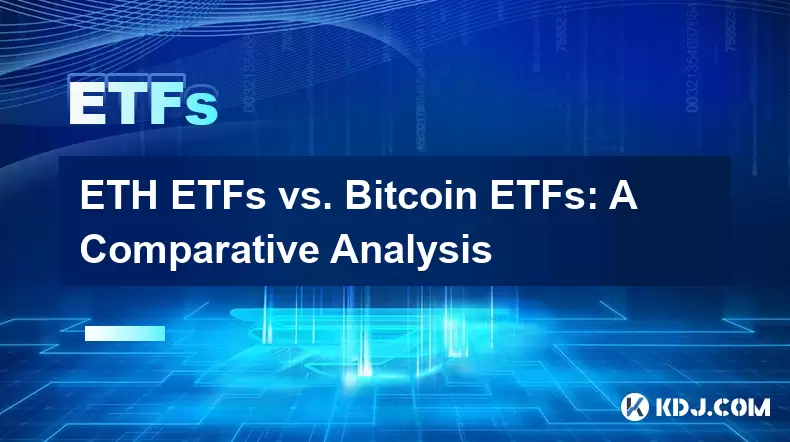
ETH ETFs vs. Bitcoin ETFs: A Comparative Analysis
Aug 07,2025 at 02:08pm
Understanding the Fundamentals of ETH and Bitcoin ETFsExchange-Traded Funds (ETFs) have become a mainstream financial instrument for gaining exposure ...
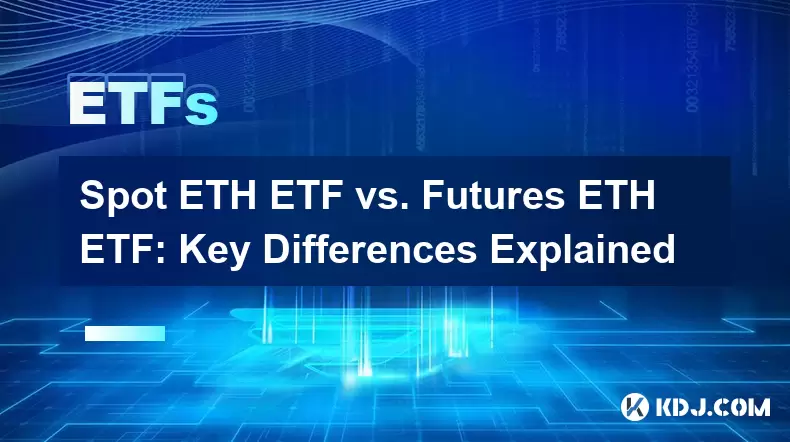
Spot ETH ETF vs. Futures ETH ETF: Key Differences Explained
Aug 07,2025 at 07:31am
Understanding Spot ETH ETFsA Spot ETH ETF is an exchange-traded fund that directly holds Ethereum (ETH) as its underlying asset. This means the fund p...
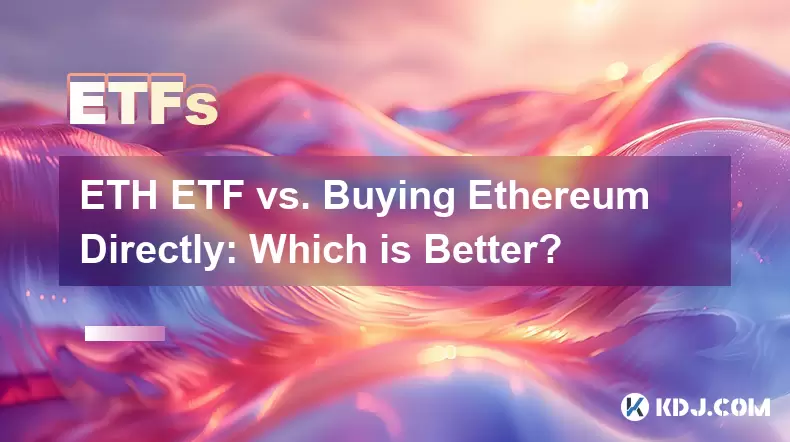
ETH ETF vs. Buying Ethereum Directly: Which is Better?
Aug 07,2025 at 01:36am
Understanding ETH ETFs and Direct Ethereum OwnershipWhen evaluating ETH ETF vs. Buying Ethereum Directly, it's essential to understand what each optio...
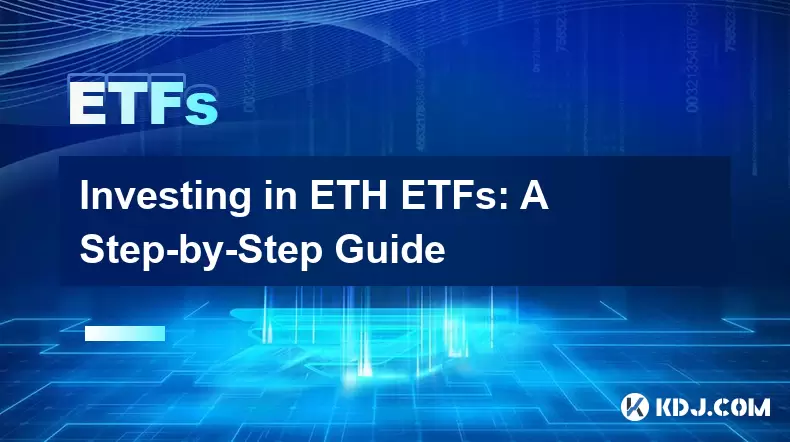
Investing in ETH ETFs: A Step-by-Step Guide
Aug 07,2025 at 05:44am
Understanding ETH ETFs and Their Role in Crypto InvestmentETH ETFs, or Ethereum Exchange-Traded Funds, represent a financial product that allows inves...
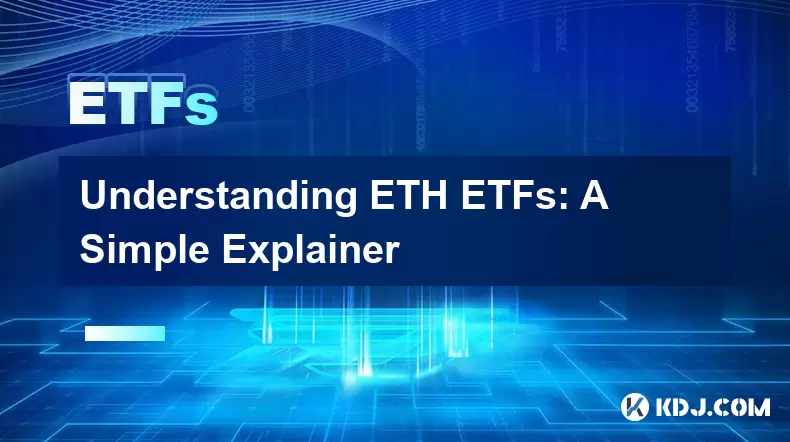
Understanding ETH ETFs: A Simple Explainer
Aug 07,2025 at 09:35am
What Are ETH ETFs and How Do They Work?ETH ETFs, or Ethereum Exchange-Traded Funds, are investment vehicles that allow investors to gain exposure to t...
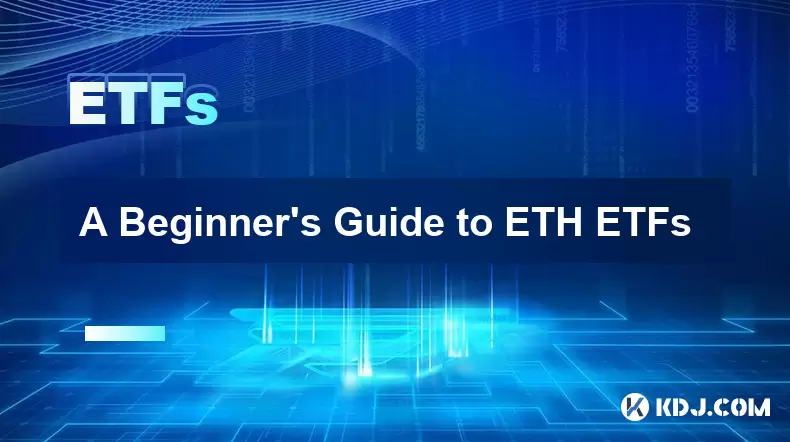
A Beginner's Guide to ETH ETFs
Aug 07,2025 at 06:38am
Understanding What an ETH ETF IsAn ETH ETF stands for Ethereum Exchange-Traded Fund, a financial product that allows investors to gain exposure to the...

ETH ETFs vs. Bitcoin ETFs: A Comparative Analysis
Aug 07,2025 at 02:08pm
Understanding the Fundamentals of ETH and Bitcoin ETFsExchange-Traded Funds (ETFs) have become a mainstream financial instrument for gaining exposure ...

Spot ETH ETF vs. Futures ETH ETF: Key Differences Explained
Aug 07,2025 at 07:31am
Understanding Spot ETH ETFsA Spot ETH ETF is an exchange-traded fund that directly holds Ethereum (ETH) as its underlying asset. This means the fund p...

ETH ETF vs. Buying Ethereum Directly: Which is Better?
Aug 07,2025 at 01:36am
Understanding ETH ETFs and Direct Ethereum OwnershipWhen evaluating ETH ETF vs. Buying Ethereum Directly, it's essential to understand what each optio...

Investing in ETH ETFs: A Step-by-Step Guide
Aug 07,2025 at 05:44am
Understanding ETH ETFs and Their Role in Crypto InvestmentETH ETFs, or Ethereum Exchange-Traded Funds, represent a financial product that allows inves...

Understanding ETH ETFs: A Simple Explainer
Aug 07,2025 at 09:35am
What Are ETH ETFs and How Do They Work?ETH ETFs, or Ethereum Exchange-Traded Funds, are investment vehicles that allow investors to gain exposure to t...

A Beginner's Guide to ETH ETFs
Aug 07,2025 at 06:38am
Understanding What an ETH ETF IsAn ETH ETF stands for Ethereum Exchange-Traded Fund, a financial product that allows investors to gain exposure to the...
See all articles

























































































